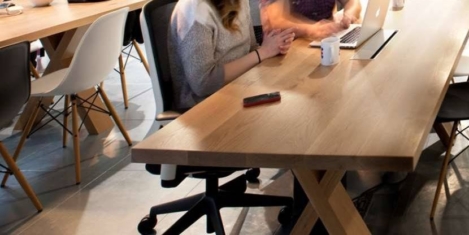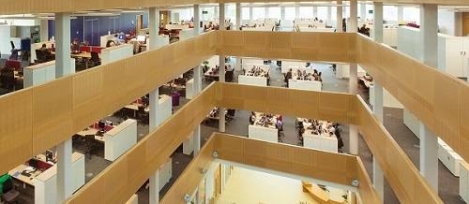December 9, 2016
The workplace holds the key to enormous productivity boost, claims study 0
 Companies could boost their productivity by between 1 and 3.5 per cent, adding as much as £70 billion to the UK economy, by focusing on how the workplace might be used to generate revenue, instead of regarding them simply as a cost to be managed. That is according to the newly published The Workplace Advantage report from The Stoddart Review based on a meta-analysis of 200 studies by workplace expert Dr Nigel Oseland. Taking a new approach to how space is used to help employees to be productive and changing who is responsible for the decisions is the first step. The Review, a collaboration between business leaders and workplace experts, found that only a little over a half (53 percent) of the UK’s office workers can say their workplace enables them to be productive. For the rest, a workplace that’s unproductive is also affecting their pride in the company, its image and culture. It found that too many businesses are prioritising filling up their offices with people rather than asking themselves ‘what will make their staff productive’. As a result, as many as 70 percent say their office is too noisy and they are disappointed by the lack of different types of workspace including communal areas and break-out zones.
Companies could boost their productivity by between 1 and 3.5 per cent, adding as much as £70 billion to the UK economy, by focusing on how the workplace might be used to generate revenue, instead of regarding them simply as a cost to be managed. That is according to the newly published The Workplace Advantage report from The Stoddart Review based on a meta-analysis of 200 studies by workplace expert Dr Nigel Oseland. Taking a new approach to how space is used to help employees to be productive and changing who is responsible for the decisions is the first step. The Review, a collaboration between business leaders and workplace experts, found that only a little over a half (53 percent) of the UK’s office workers can say their workplace enables them to be productive. For the rest, a workplace that’s unproductive is also affecting their pride in the company, its image and culture. It found that too many businesses are prioritising filling up their offices with people rather than asking themselves ‘what will make their staff productive’. As a result, as many as 70 percent say their office is too noisy and they are disappointed by the lack of different types of workspace including communal areas and break-out zones.





















 Two of the most persistent and related structural problems facing the UK economy are the productivity and digital skills gaps. Earlier this month, the Office for National Statistics reported that there had been a further 1.2 percent fall in productivity. Part of the reason for this is that there is an underlying digital skills gap. According to a report from Barclays, nearly a third (31 percent) of working-age adults in the UK lack even basic digital problem-solving skills which places the country comfortably below the 37 percent average across OECD countries. Despite this, a mere 38 percent of UK employers offer their workers digital skills training, perhaps because on the other side of the coin, the UK ranks highly in what the report calls ‘digital empowerment’, which it defines as ‘the ability and desire to use one’s digital skills to work productively and creatively, and to have the opportunity to continually upgrade them to keep pace with changing technology’.
Two of the most persistent and related structural problems facing the UK economy are the productivity and digital skills gaps. Earlier this month, the Office for National Statistics reported that there had been a further 1.2 percent fall in productivity. Part of the reason for this is that there is an underlying digital skills gap. According to a report from Barclays, nearly a third (31 percent) of working-age adults in the UK lack even basic digital problem-solving skills which places the country comfortably below the 37 percent average across OECD countries. Despite this, a mere 38 percent of UK employers offer their workers digital skills training, perhaps because on the other side of the coin, the UK ranks highly in what the report calls ‘digital empowerment’, which it defines as ‘the ability and desire to use one’s digital skills to work productively and creatively, and to have the opportunity to continually upgrade them to keep pace with changing technology’.







December 23, 2016
Presenteeism doesn’t aid productivity, so employers should set workers free 0
by Mark Eltringham • Comment, Flexible working
(more…)